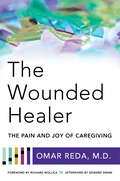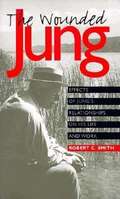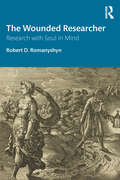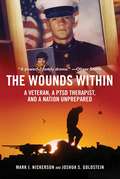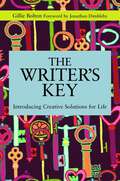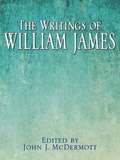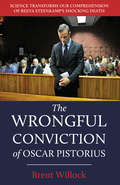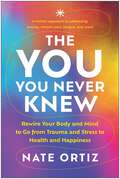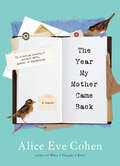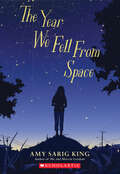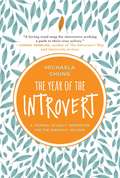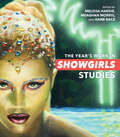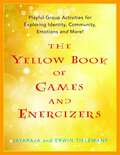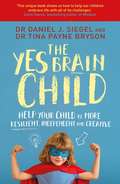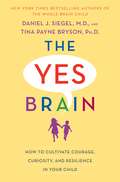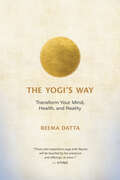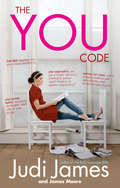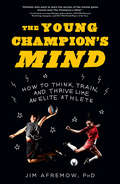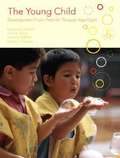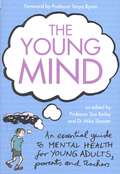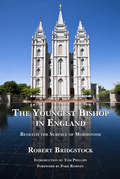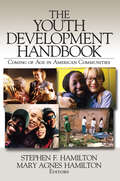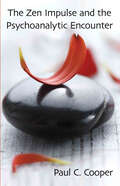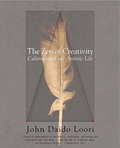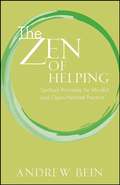- Table View
- List View
The Wounded Healer: The Pain and Joy of Caregiving
by Omar RedaFinding meaning in trauma work, as a traumatized healer yourself. The act of caregiving is physically exhausting and emotionally draining, yet caregivers describe it as rewarding and gratifying. Prolonged exposure to human suffering, however, is not without risks?caregivers report high rates of burnout and poor quality of life. Many care providers believe that their feelings do not matter; that they should ignore their pain, brush off their trauma, wipe away their tears, and just “suck it up.” Here, Omar Reda a Libyan-born American psychiatrist who, as an emergency physician and trauma counselor provided care for medical staff caring for victims of trauma, calls upon other healers to break free from cycles of secrecy, toxic stress, and silent suffering so they can continue to empower and inspire those in their care. Filled with poignant first-person stories and clinical case studies, this book is an impassioned plea for psychosocial trauma care that prioritizes the health of both client and healer.
The Wounded Jung: Effects of Jung's Relationships on His Life and Work
by Robert C. SmithShows how Jung's interest in the healing of the psyche was rooted in the conflicts of his own childhood. Explores his relationships with his parents, with Freud, and with the various women in his life and showing how they influenced his ideas on religion, alchemy, psychology as myth, and the reinterpretation of evil. Based on archival sources, interviews with Jung's intimates, and correspondence. For those interested in the connection between psychology and religion. Annotation c. by Book News, Inc., Portland, Or.
The Wounded Researcher: Research with Soul in Mind (Studies In Archetypal Psychology)
by Robert D. RomanyshynThe Wounded Researcher addresses the crises of epistemological violence when we fail to consider that a researcher is addressed by and drawn into a work through his or her complexes. Using a Jungian-Archetypal perspective, this book argues that the bodies of knowledge we create degenerate into ideologies, which are the death of critical thinking, if the complexity of the research process is ignored. Writing with soul in mind invites us to consider how we might write down the soul in writing up our research.
The Wounds Within: A Veteran, a PTSD Therapist, and a Nation Unprepared
by Joshua S. Goldstein Mark I. Nickerson<p>As America’s longest wars end, hundreds of thousands of veterans and their families struggle with post-traumatic stress disorder (PTSD). <i>The Wounds Within</i> follows the case of Marine Lance Corporal Jeff Lucey, who deployed early in the Iraq War, battled PTSD after returning home, and set his family on a decade-long campaign to reform the Veterans Affairs system and end the stigma around military-related mental health issues, with the perspective of Jeff’s psychotherapist, Mark Nickerson, an internationally recognized expert on trauma treatment. <p>Recounting one family’s story as well as case histories of Nickerson’s veteran clients, the book explains PTSD and the methods by which it can be treated. It also explores the challenges and frustrations facing returning veterans from Iraq and Afghanistan—from belated reforms to overwhelmed military families to civilians who don’t know what to say beyond “Thank you for your service.”</p>
The Writer's Key: Introducing Creative Solutions for Life
by Gillie BoltonThe Writer's Key is a complete beginner's guide to writing for self-reflection and personal development. Creative writing can deepen our understanding of ourselves and our lives. This book unlocks the potential for gaining these insights, widening perspectives, finding new positivity, increasing confidence and reducing stress through writing. It: - introduces creative writing as a very enjoyable process for enabling reflective personal and professional development - provides strategies and inspiration for getting started, continuing despite hesitations and getting the most out of writing - features uplifting accounts of individuals' successful use of the Key for self-exploration and development through creative writing. The Writer's Key assumes no prior writing experience and will inspire and encourage anyone who wants to tell and explore their story, whether they feel trapped by issues at work or home because of loss, trauma or relationships, or simply want to make more of life.
The Writings of William James
by John J. McdermottA Modern Library collection of writings by the American psychologist, philosopher, and writer William James. His writings touch on themes of psychology, religion, free will, and pragmatism.
The Wrongful Conviction of Oscar Pistorius: Science Transforms our Comprehension of Reeva Steenkamp’s Shocking Death
by Brent WillockJust when the world thought Oscar Pistorius’ meteoric rise to Olympic glory and international celebrity had terminated abysmally in prison, Brent Willock’s scientific perspective reopens this gripping narrative for an astonishing re-view.Olympian Oscar Pistorius’ spectacular assent to fame ground to a screeching halt in the wee hours of Valentine’s Day, 2013. Hearing a sound emanating from his bathroom, he grabbed his pistol and he stumbled to the washroom, screaming at the intruders to leave. Fearing someone was about to emerge to harm him and his girlfriend, Reeva, he fired four bullets into the bathroom. Soon he realized he had killed his lover. Horrified, he summoned the authorities. The investigating detective believed this was yet another case of an escalating argument where a man murdered his partner. World opinion is split. Some believe Oscar. Others are convinced he committed a despicable crime of passion.Distinguished clinical psychologist Brent Willock brings an entirely new perspective to bear on these horrific events: that Oscar’s horrific actions occurred while he was in a state of paradoxical sleep, also known as parasomnia. Throughout this book, Willock uses scientific scrutiny and legal precedence to resolve the crucial anomalies surrounding the Oscar Pistorius trial. Willock also discusses how mental health experts and the defense team might have overlooked the hypothesis of parasomnia that could have exonerated Oscar.Millions who followed the Blade Runner’s astonishing achievements, uplifted and inspired by his triumph over physical adversity, were crushed by his precipitous plunge from grace. They were baffled. Even Oscar himself, in a television interview shortly before his sentencing, achingly asked, “I always think, How did this possibly happen? How could this have happened?” At last, Willock’s elegant work responds to these poignant questions that have so plagued and pained Reeva’s family, friends, Oscar, and, indeed, the world.
The YOU You Never Knew: Rewire Your Body and Mind to Go from Trauma and Stress to Health and Happiness
by Nate OrtizYour body is not broken. It is designed to send you clear messages when your life is out of balance. Let this comprehensive, compassionate guide set you on the path toward a brighter tomorrow.Trauma and stress don&’t just affect the mind. They affect the whole body. Which is why healing that trauma, and the physical health issues it leads to, requires a holistic approach. Developed from health coach Nate Ortiz&’s personal experience with overcoming trauma and succeeding against the odds, along with his professional work with thousands of celebrity and everyday clients, The YOU You Never Knew is an empowering tool for those on their own journey of healing and transformation. Grounded in the neuroscience of trauma and stress, Nate&’s system will teach you how to balance mind, body, and spirit, eliminate pain, and thrive—by learning: How trauma shapes your perceptions, thoughts, and choices—and how to rewrite those patterns Simple ways to regulate your parasympathetic nervous system for reduced stress and improved sleep, digestion, and immunity Proven practices that correct muscle imbalances to improve posture, reduce pain, and regain energy Strategies for improving bodily awareness, to help you better recognize what your body needs to heal Take control of your well-being and become the best version of yourself—one free of the stress, fatigue, anxiety, and health issues that plague you. Discover the true you, beyond your past hurts, hidden beliefs, and unhealthy habits. Discover the you you never knew.
The Year My Mother Came Back: A Memoir
by Alice Eve Cohen“A riveting journey.” —Julie Metz, author of Perfection “A perfect book. I want to tell everyone, every mother, every daughter, to read it.” —Abigail Thomas, bestselling author of A Three Dog LifeFor the first time in decades I’m remembering Mom, all of her--the wonderful and terrible things about her that I’ve cast out of my thoughts for so long. I’m still struggling to prevent these memories from erupting from their subterranean depths. Trying to hold back the flood. I can’t, not today. The levees break. Thirty years after her death, Alice Eve Cohen’s mother appears to her, seemingly in the flesh, and continues to do so during the hardest year Alice has had to face: the year her youngest daughter needs a harrowing surgery, her eldest daughter decides to reunite with her birth mother, and Alice herself receives a daunting diagnosis. As it turns out, it’s entirely possible for the people we’ve lost to come back to us when we need them the most. Although letting her mother back into her life is not an easy thing, Alice approaches it with humor, intelligence, and honesty. What she learns is that she must revisit her childhood and allow herself to be a daughter once more in order to take care of her own girls. Understanding and forgiving her mother’s parenting transgressions leads her to accept her own and to realize that she doesn’t have to be perfect to be a good mother. “Alice Eve Cohen’s warm, witty, wise memoir is an elixir of love. It captures the struggles of every woman who ever wanted to be a better mother or daughter. Read it and weep, and laugh, and love.” —Nancy Bachrach, author of The Center of the Universe “Funny, painful, absurd, and heartwarming . . . Alice’s struggle to accept her imperfect self is a loving message tomothers who struggle to live life with grace. A beautiful book.” —Julie Metz, New York Times bestselling author of Perfection “Cohen navigates what was a perfect storm of a year . . . What she made of this year is a book so honest, so moving, and ultimately so wise that it is a privilege to take the journey with her.” —Abigail Thomas, bestselling author of A Three Dog Life “I love, love, love this book. It’s so rich, so real, and so moving . . . An astonishingly wonderful book—I was enthralled.” —Caroline Leavitt, bestselling author of Pictures of You “Compassionate, compelling, and told in luscious prose that practically begs you to sink in and linger, Cohen’s imaginative story and its fascinating characters will stay with you long after you’ve turned the last page.” —Jessie Sholl, author of Dirty Secret
The Year We Fell From Space
by Amy Sarig KingLiberty Johansen is going to change the way we look at the night sky. Most people see the old constellations, the things they've been told to see. But Liberty sees new patterns, pictures, and possibilities. She's an exception. Some other exceptions:Her dad, who gave her the stars. Who moved out months ago and hasn't talked to her since.Her mom, who's happier since he left, even though everyone thinks she should be sad and lonely.And her sister, who won't go outside their house. Liberty feels like her whole world is falling from space. Can she map a new life for herself and her family before they spin too far out of reach?
The Year of the Introvert: A Journal of Daily Inspiration for the Inwardly Inclined
by Michaela Chung365 quotes, insights, and journaling prompts for the blossoming introvert.The Year of the Introvert is a seasonal daybook and journal that takes introverts on a true adventure in introspection and self-care, 365 days of the year. With each page of daily insight, Michaela Chung provides an interactive roadmap for introverts who wish to embrace who they are and live a fulfilling—and powerful!—life on their own quiet terms. Within these pages, you’ll discover quotes, prompts, and inspirational essays to propel you toward greater self-awareness, and self-love. Along the way, you’ll receive daily morsels of wisdom to strengthen your relationships, develop authentic confidence, survive the holidays, and truly blossom in your own introverted way. Ask introspective questions to awaken your inner adventurerGet tips on how to love your introversion and yourselfLearn how to cut through small talk and truly connectBe quietly magnetic in your romantic relationshipsBuild cozy living spaces that will replenish your energyAnd more!The Year of The Introvert is the ideal introvert’s companion for navigating the challenges and joys of being an introvert in an extrovert’s world. Reflect on your quiet strengths, water your natural wellspring of creativity, and take ownership of your “innie” life!
The Year's Work in Showgirls Studies (The Year's Work: Studies in Fan Culture and Cultural Theory)
by Kara Keeling Adrian Martin Shawna Tang Anna Breckon Kieryn McKay Jane Chi Park Zahra Stardust Billy StevensonThe Year's Work in Showgirls Studies is a fan culture volume that deconstructs how and why Showgirls, a 1995 drama with a female lead bent on becoming a famous performer in Las Vegas, became a much-contested cult film despite being a critical failure when it released. The collection orchestrates a conversation between scholarly essay work and archival documentation offering a magnificent representation of the array of responses generated by the film, its makers, its promoters, and its audience. A multifaceted approach to the film, its popularity, and its social relevance results in a new text for understanding normative social hierarchies of sexuality, race, and gender. The Year's Work in Showgirls Studies engages with the figurative and actual place of sex work and feminized affective labor in our society.
The Yes Brain Child: Help Your Child be More Resilient, Independent, and Creative
by Ph.D. Tina Payne Bryson Daniel J SiegelChildren can often act out or shut down when faced with a setback or a tricky issue like homework, food or screen time. This is what acclaimed parenting experts Dr Siegel and Dr Bryson call the ‘No Brain’ response. But you can help your child develop the ability to cope, solve their own problems and thrive by nurturing their ‘Yes Brain’. Drawing on their successful work with thousands of parents and children from all backgrounds, Dr Siegel and Dr Bryson provide the advice, tools and activities to help parents with children of all ages.This is what the ‘Yes Brain’ approach looks like in action: *A 5-year-old boy thinks about his first day at school and says, ‘I’m nervous but I’ll give it a try.’ *An 8 year-old girl says, ‘I’d like to join the football team, even though none of my friends like football.’ *A 14 year-old boy looks at a test he’s earned a D- for and says, ‘That’s not the mark I wanted but it’s not the end of the world. I’ll ask the teacher how I can improve.’
The Yes Brain: How to Cultivate Courage, Curiosity, and Resilience in Your Child
by Daniel J. Siegel Tina Payne BrysonFrom the authors of The Whole-Brain Child and No-Drama Discipline, an indispensable guide to unlocking your child’s innate capacity for resilience, compassion, and creativity.When facing challenges, unpleasant tasks, and contentious issues such as homework, screen time, food choices, and bedtime, children often act out or shut down, responding with reactivity instead of receptivity. This is what New York Times bestselling authors Daniel J. Siegel and Tina Payne Bryson call a No Brain response. But our kids can be taught to approach life with openness and curiosity. Parents can foster their children’s ability to say yes to the world and welcome all that life has to offer, even during difficult times. This is what it means to cultivate a Yes Brain. When kids work from a Yes Brain, they’re more willing to take chances and explore. They’re more curious and imaginative, less worried about making mistakes. They’re better at relationships and more flexible and resilient when it comes to handling adversity and big feelings. They work from a clear internal compass that directs their decisions, as well as the way they treat others. Guided by their Yes Brain, they become more open, creative, and resilient. In The Yes Brain, the authors give parents skills, scripts, ideas, and activities to bring kids of all ages into the overwhelmingly beneficial “yes” state. You’ll learn • the four fundamentals of the Yes Brain—balance, resilience, insight, and empathy—and how to strengthen them • the key to knowing when kids need a gentle push out of a comfort zone vs. needing the “cushion” of safety and familiarity • strategies for navigating away from negative behavioral and emotional states (aggression and withdrawal) and expanding your child’s capacity for positivity With inspirational anecdotes, fun and helpful illustrations, and a handy Yes Brain Refrigerator Sheet to keep your family on point, The Yes Brain is an essential tool for nurturing positive potential and keeping your child’s inner spark glowing and growing strong—and gifting your children with a life of rich relational connections, meaningful interactions with the world, and emotional equanimity.
The Yogi’s Way: Transform Your Mind, Health, and Reality
by Reema DattaFIND PEACE, CREATIVITY, VITALITY, AND PURPOSE Celebrated yogi Reema Datta presents her world-renowned twelve-week course in book form — an accessible and practical method for cultivating mental and emotional well-being, physical health, and spiritual nourishment. She combines ancient yogic wisdom and practices with cutting-edge science and personal stories to offer insightful solutions to the challenges of modern life. Her holistic program integrates movement and breathwork with visualization, meditation, and awareness practices. The Yogi’s Way will help you overcome challenging thoughts and emotions such as fear and anxiety, awaken your creative potential, and connect with consciousness — the deepest and most powerful part of yourself.
The You Code: What your habits say about you
by James Moore Judi JamesDid you know that the way you eat your food will be sending subliminal messages out about your sexual habits? Or that the way you decorate your desk, could be helping your boss decide about that promotion or pay rise? We're all aware of the subtle messages of design and marketing but what about the signals you send out about yourself and your personality?The You Code is the book that answers all these questions, uncovering the hidden meaning behind the simplest of choices. Judi James, with co-writer and journalist James Moore, pulls no punches in her addictive and entertaining book which gets to the nub of who you really are, telling you more about yourself than you ever wanted to know, as well as providing an intriguing insight into the people around you. From your favourite TV programme to the type of coffee you drink, even down to the filling in your sandwich, The You Code is a must for anyone who wants to find out more about themselves and, more importantly, what everyone else thinks of them.
The Young Champion's Mind: How to Think, Train, and Thrive Like an Elite Athlete
by Jim AfremowSports psychologist Jim Afremow has earned accolades from Olympians to professional athletes for his insightful approach to training the mind, body, and spirit of a competitor. Now this award-winning coach is turning his talents to student athletes in the new young adult edition of his highly praised The Champion’s Mind. As student athletes strive to balance their school and sports accomplishments, Dr. Afremow’s sage advice will be a much-needed guide in helping them navigate the field—or rink or court.The Young Champion’s Mind covers such topics as:- Tips on how to get in a “zone,” thrive on a team, and stay humble - How to progress within a sport and sustain excellence long-term - Customizable pre-performance routines to hit full power when the gun goes off or the puck is dropped
The Young Child: Development from Prebirth through Age Eight (5th Edition)
by Margaret B. Puckett Janet K. Black Donna S. Wittmer Sandra H. PetersenA thorough updating of topics including: standards for early childhood programs, the mandates of IDEA, developmental theories, changing demographics, assessments, child care practices and bullying . For child development courses that cover prebirth through age eight, this widely used text discusses major development theories as they relate to physical, social and emotional, and cognitive domains. The book contains extensive applications for those who teach and work with young children, making it particularly appropriate for early childhood education programs.
The Young Mind
by Mike Shooter Sue BaileySadly, millions of children today are affected by mental health problems, almost a doubling of the number of sufferers in just one generation. Now, in this timely new book, mental health experts provide invaluable information and guidance for concerned parents, teachers and young adults. With chapters covering subjects such as child and adolescent development, parenting skills, problems at school, emotional health and wellbeing, The Young Mind also looks specifically at some of the most distressing problems facing young people today, including anxiety and stress disorders, drugs, alcohol, self-harm and psycho-sexual development.Illustrated and written in a completely accessible style by some of the most distinguished and respected professionals in the field of child and adolescent psychiatry, The Young Mind offers a guiding hand and insight into this most vital area of mental health.
The Youngest Bishop in England: Beneath the Surface of Mormonism
by Robert BridgstockPart memoir, part analytical work, this treatise details Robert Bridgstock's life as an active Mormon, his struggles with his faith, his submerging of such doubts for the sake of keeping peace with his devout family, and his eventual departure from the Church due to the abuse he suffered. After joining the Mormon Church at the age of 18, Bridgstock went on to become the youngest Mormon bishop in England and remained active in the Church for more than four decades, serving it in many capacities and deeply studying Mormon scripture and history. But after having and voicing doubts about Mormonism, and because Church authorities and scripture never delivered satisfactory answers to his questions, he left the Church and renounced the religion. An enthralling read from a leading figure within the Church, this account provides a unique, day-to-day look into Mormon life.
The Youth Development Handbook: Coming of Age in American Communities
by Stephen F. Hamilton Dr Mary Agnes HamiltonWhat are the types of environments in which youth thrive? How do we cultivate such environments to promote optimal development and positive behavior in youth? The Youth Development Handbook: Coming of Age in American Communities provides youth and development practitioners access to current theory and research in the field of youth development, including illustrations of good practice, original case studies, and a contextual approach to such topics as youth participation and diversity. The Youth Development Handbook is designed for scholars and researchers in applied developmental science as well as practitioners and policy makers who implement youth development initiatives. The book is also recommended for use in graduate courses on youth development in the fields of Psychology, Human Development & Family Studies, and Education.
The Zen Impulse and the Psychoanalytic Encounter
by Paul C. CooperAlthough psychoanalysis and Zen Buddhism derive from theoretical and philosophical assumptions worlds apart, both experientially-based traditions share at their heart a desire for the understanding, development, and growth of the human experience. Paul Cooper utilizes detailed clinical vignettes to contextualize the implications of Zen Buddhism in the therapeutic setting to demonstrate how its practices and beliefs inform, relate to, and enhance transformative psychoanalytic practice. The basic concepts of Zen, such as the identity of the relative and the absolute and the foundational principles of emptiness and dependent-arising, are given special attention as they relate to the psychoanalytic concepts of the unconscious and its processes, transference and countertransference, formulations of self, and more. In addition, through an analysis of apophasis, a unique style of discourse that serves as a basic structure for mystical languages, he provides insight into the structure of the seemingly irrational Zen koan in order to demonstrate its function as a pedagogical and psychological tool. Though mindful of their differences, Cooper’s intent throughout is to illustrate how the practices of both Zen and psychoanalysis become internalized by the individual who engages in them and can, in turn, inform one another in mutually beneficial ways in an effort to comprehend the ramifications of an individual or collective expanding vision.
The Zen of Creativity
by John Daido LooriFor many of us, the return of Zen conjures up images of rock gardens and gently flowing waterfalls. We think of mindfulness and meditation, immersion in a state of being where meaning is found through simplicity. Zen lore has been absorbed by Western practitioners and pop culture alike, yet there is a specific area of this ancient tradition that hasn't been fully explored in the West. Now, in The Zen of Creativity, American Zen master John Daido Loori presents a book that taps the principles of the Zen arts and aesthetic as a means to unlock creativity and find freedom in the various dimensions of our existence. Loori dissolves the barriers between art and spirituality, opening up the possibility of meeting life with spontaneity, grace, and peace.Zen Buddhism is steeped in the arts. In spiritual ways, calligraphy, poetry, painting, the tea ceremony, and flower arranging can point us toward our essential, boundless nature. Brilliantly interpreting the teachings of the artless arts, Loori illuminates various elements that awaken our creativity, among them still point, the center of each moment that focuses on the tranquility within; simplicity, in which the creative process is uncluttered and unlimited, like a cloudless sky; spontaneity, a way to navigate through life without preconceptions, with a freshness in which everything becomes new; mystery, a sense of trust in the unknown; creative feedback, the systematic use of an audience to receive noncritical input about our art; art koans, exercises based on paradoxical questions that can be resolved only through artistic expression. Loori shows how these elements interpenetrate and function not only in art, but in all our endeavors.Beautifully illustrated and punctuated with poems and reflections from Loori's own spiritual journey, The Zen of Creativity presents a multilayered, bottomless source of insight into our creativity. Appealing equally to spiritual seekers, artists, and veteran Buddhist practitioners, this book is perfect for those wishing to discover new means of self-awareness and expression--and to restore equanimity and freedom amid the vicissitudes of our lives.From the Hardcover edition.
The Zen of Helping
by Andrew BeinBring compassion, self-awareness, radical acceptance, practitioner presence, and caring to the relationships you have with you patients by utilizing the advice in The Zen of Helping: Spiritual Principles for Mindful and Open-Hearted Practice. As a mental health professional, you will appreciate the vivid metaphors, case examples, personal anecdotes, quotes and poems in this book and use them as a spiritual foundation for your professional practice. Connect Zen Buddhism with your human service and address issues like dealing with your own responses to your client's trauma and pain.
